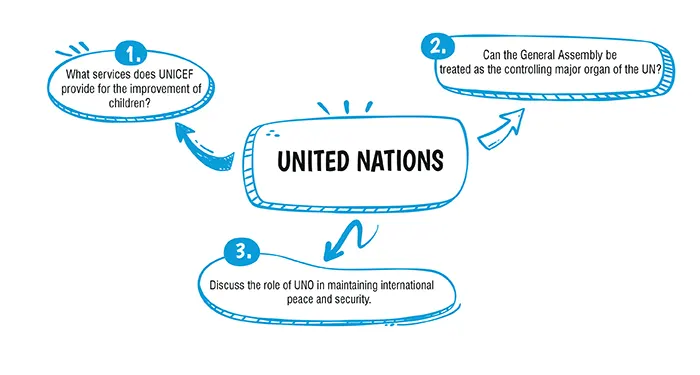Home / Board / ICSE / important Questions / Class 10 / History & Civics / United Nations
Table of Contents

Ans.(a) 1946
Explanation:
The United Nations International Children's Emergency Fund (UNICEF) was established in 1946, in the aftermath of World War II.
Ans.(d) 26
Explanation:
The name "United Nations," coined by United States President Franklin D. Roosevelt, was first used in the Declaration by the United Nations of 1 January 1942 during the Second World War, when representatives of 26 nations pledged their Governments to continue fighting together against the Axis Powers.
Explanation:
UNICEF provides services in primary health care, nutrition, basic education and sanitation for children. It works for family and child welfare and promotes vocational training, and carries on community based programmes involving people’s participation.
Explanation:
The General Assembly is the principal deliberative organ of the UN. It considers reports of the Security Council and other organs, considers and approves the budget. It elects non-permanent members of the Security Council, the Economic and Social Council and Trusteeship Council. It elects the Judges of the International Court of Justice and appoints the Secretary-General of the UN on recommendation of the Security Council. It deals with all matters of policy making and can be treated as the Legislature of the UN.
Explanation:
The United Nations Organisation undertook the gigantic three dimensional task of peace-keeping, peacemaking and peace-building in a world which had just been a victim of a devastating world war.
Thus, the primary function of the UNO is to maintain international peace and security. This includes collective effective measures for prevention and removal of threats to peace, and suppression of acts of aggression or other breaches of peace. To bring about through peaceful means, adhering to principles of justice and international law adjustment and settlement of international disputes.
Thus, the cause of action for UNO arises when there is threat to peace, or actual aggression causing breach of peace. The means for settling disputes are recommended to be peaceful but where suppression of aggression is required the Security Council is authorised to use military operations. For instance in Korea, Palestine and Congo and in the Gulf War the UN military forces played a decisive role.
Download Mind Map of this chapter
Download NowWant to Practice Mock Tests of this chapter
Practice NowDownload Important Questions of this chapter
Download NowCBSE Important Questions Class 10
ICSE Important Questions Class 10
CBSE Important Questions Class 10
ICSE Important Questions Class 10